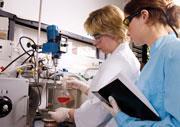The RSC has published a suite of chemistry teaching and learning resources as a result of the National HE STEM Programme

The National HE STEM Programme reached its conclusion on 31 July. The RSC had a big part to play as one of the partner organisations. In three years, the programme has invested £21m of funding from the higher education funding councils of England and Wales (HEFCE and HEFCW), in a range of projects and initiatives to transform higher education capability.
Building on the RSC's Chemistry for our Future initiative, the National HE STEM Programme set out to bring the most successful aspects of this project to the whole of the chemistry higher education community, with activities spanning the whole of the higher education pipeline, from entering university to the university experience to the transition from university to the workplace.
Spectroscopy in a Suitcase
One of the great successes was the RSC's Spectroscopy in a Suitcase (SiaS) scheme. This outreach activity brought portable spectroscopic equipment (infrared and UV-vis spectrometers) into schools giving students first-hand, practical experience of spectroscopy.
For many schools, teaching spectroscopy in a practical manner is simply beyond their means, so SiaS brings analytical techniques out of the textbook and into everyday life and continues to be hosted by 21 universities across the country, with over 26,000 students attending events to date.
In addition, the redeveloped SpectraSchool website introduces students to the principles of IR, NMR, UV-vis and mass spectrometry and allows them to study, manipulate and interpret real spectra of dozens of compounds, and students and teachers alike are now better prepared than ever to learn about this topic.
Higher Education Resources
Over 25 new resources are now available on Learn Chemistry to support teaching and learning in higher education. They are focused on subject-contextualised and interactive learning to enable students to develop key skills vital to success in the workplace.
A suite of 10 resources has been developed by experts in context- and problem-based learning. This teaching method complements traditional lectures and tutorials by providing students with real-life, in depth problems that they must work on together to research, investigate and solve. As well as demanding that students adapt and apply their knowledge of chemistry to new situations, this method of teaching develops the vital skills of teamwork, communication, leadership and professionalism.

School Teacher Fellows
The School Teacher Fellowship scheme brings secondary school chemistry teachers into the university teaching environment to aid the transition from school to university. With their knowledge of the secondary school curriculum and their understanding of students' experiences and abilities, School Teacher Fellows are a valuable resource for universities, providing support to students, informing university teaching staff, and undertaking initiatives to deal with the skills and knowledge gaps that hinder students' progression, particularly in the early stages of university.
Industrial Placements
There can be no substitute for the quality of understanding gained by workplace experience and so increasing the number of students undertaking industrial placements has been another aspect of the National HE STEM Programme.
The RSC has worked with chemistry departments and employers to produce a guide to industrial placements, with advice for both universities and employers on every aspect of placements from finding and setting up placement opportunities, to how to make placements effective and practical guidance on confidentiality and assessment. Placement opportunities are also being advertised through the RSC's job site, Chemistry World Jobs.
Legacy
These achievements are highlights of the RSC's work over the last three years and represent just a portion of the vast array of projects delivered across the whole National HE STEM Programme. As the UK's higher education landscape is changed and moulded by funding and policies, the legacy of the HE STEM Programme is a community better prepared and better equipped to respond and to maintain its position as a world leader in education.
Also of interest
HE STEM Programme
A HEFCE/ HEFCW-funded programme aimed at widening participation in STEM subjects in higher education
Related Links
SpectraSchool
A range of resources to help in your understanding of the principles and practice of spectroscopy and spectroscopic methods
RSC HE resources
Resources to support chemistry teaching and learning in higher education
Hosting industrial placements in chemistry
Provides guidance on best practice to companies hosting year-long industrial placements for students
Chemistry World Jobs
Careers in chemistry and the chemical sciences brought to you by the Royal Society of Chemistry in conjunction with Chemistry World magazine
References






No comments yet